fork Lecture 09 `using`rpar
Lecture plan
- Concurrency with Haskell lightweight threads
- Synchronization between threads
- Exceptions revisited
- Async
- STM (Software Transaction Memory)
- Parallelism with Sparks
- Inspecting your concurrency (ThreadScope)

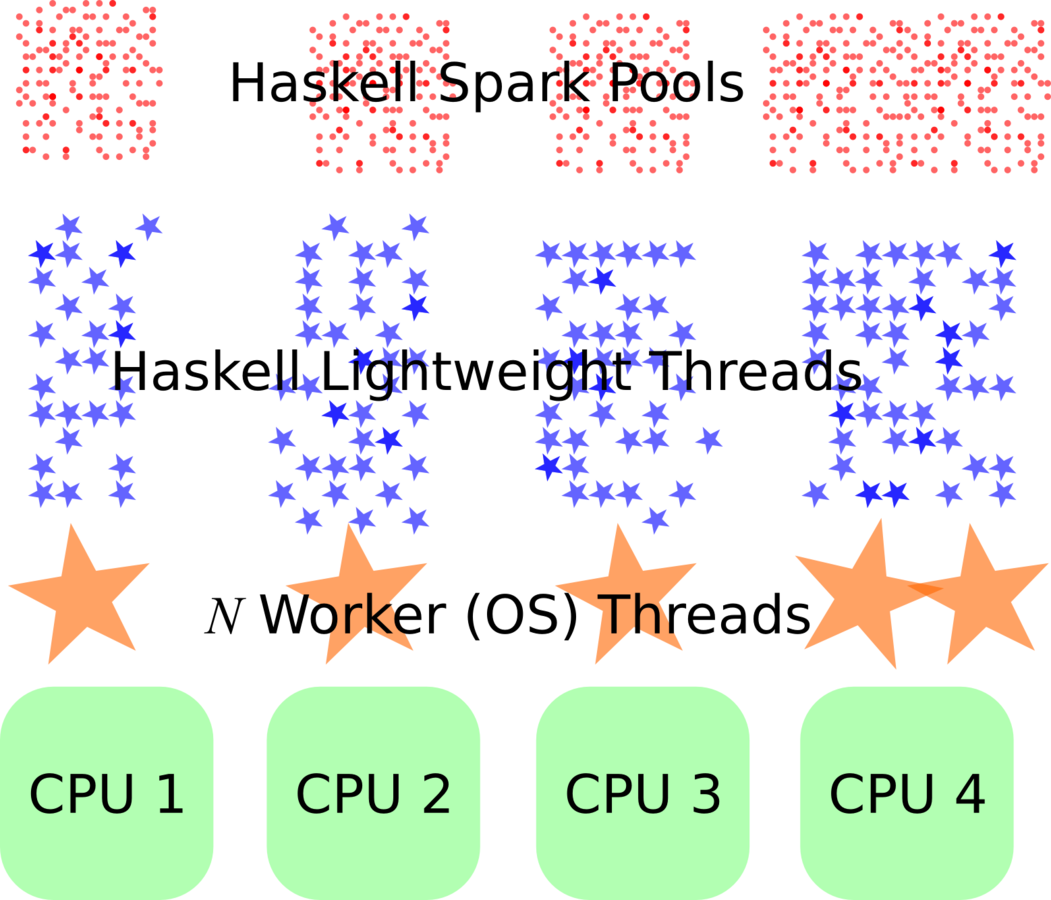
Fork a thread
forkIO :: IO () -> IO ThreadId -- creates lightweight threadimport Control.Concurrent
main = do
_threadId <- forkIO $ do
threadDelay 1000000
putStrLn "Forked thread awake"
threadDelay 2000000
putStrLn "Main thread finishes"
$ ghc -threaded -o test Test.hs
$ ./test +RTS -N2
Forked thread awake
Main thread finishesBy default threads are off, but you still can run the code above.
$ ghc -o test Test.hs && ./test
Forked thread awake
Main thread finishes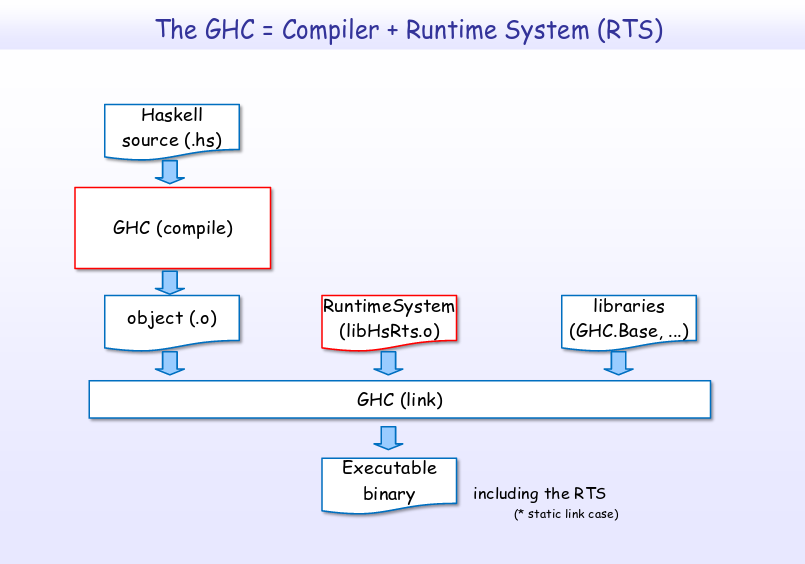
data MVar a -- empty or full box
newEmptyMVar :: IO (MVar a) -- create empty box
putMVar :: MVar a -> a -> IO () -- fill box with value
takeMVar :: MVar a -> IO a -- take var with blockimport Control.Concurrent
main = do
tm1 <- newEmptyMVar
tm2 <- newEmptyMVar
_threadId1 <- forkIO $ do
threadDelay 1000000
putMVar tm1 100500
_threadId2 <- forkIO $ do
threadDelay 1000000
putMVar tm2 "This is horosho"
r1 <- takeMVar tm1
r2 <- takeMVar tm2
putStrLn $ "r1: " <> show r1 <> ", r2: " <> show r2Where is my join?
More about MVar
MVar is basically a value guarded by mutex lock.
-- MVTest.hs
main = do
m <- newEmptyMVar
takeMVar m-- throws BlockedIndefinitelyOnMVar exception
MVTest: thread blocked indefinitely in an MVar operation-- all exceptions
BlockedIndefinitelyOnMVar
BlockedIndefinitelyOnSTM
NonTermination
DeadlockAnd runtime system is able to detect some deadlock cases.
What to do thread id?
Stop (interrupt) a thread :)
throwTo :: Exception e => ThreadId -> e -> IO ()
killThread :: ThreadId -> IO ()
killThread tid = throwTo tid ThreadKilled
main =
handle intrHandler $
flip mapM_ [1..1000] $ \i -> do
threadDelay 1000000
putStrLn $ "Finished round " <> show i
intrHandler :: AsyncException -> IO ()
intrHandler UserInterrupt = putStrLn "Finishing due to user interrupt ..."
intrHandler e = putStrLn $ "Caught async exception: " <> show e
How to handle ^C from user? It's an exception to main thread ;)
main = do
tid <- forkIO myHeavyComputation
threadDelay 1000000 -- 1 sec timeout for completion
killThread tidExceptions classification
Synchronous exceptions
throwIO :: Exception e => e -> IO a
throw :: Exception e => e -> ainstance Integral Int where
a `div` b
| b == 0 = throw DivideByZero
| otherwise = ...foreign import ccall safe "HsBase.h __hscore_open"
c_safe_open :: CFilePath -> CInt -> CMode -> IO CInt
openFile file flags mode = do
res <- c_safe_open file flags mode
when (res == -1) $ do
errno <- getErrNo
throwIO (toIOError errno file)Asynchronous exceptions
throwTo :: Exception e => ThreadId -> e -> IO ()Handle exception
Exception handling is uniform
catch :: Exception e => IO a -> (e -> IO a) -> IO a
handle :: Exception e => (e -> IO a) -> IO a -> IO a
handle = flip catchdata MyException = MyException deriving Show
instance Exception MyException
main = do
throwIO MyException
`catch` \MyException -> putStrLn "Caught my IO exception"
when (1 `div` 0 > 0) (putStrLn "not to happen")
`catch` \e -> putStrLn $ "Caught " <> show (e :: ArithException)
tid <- forkIO $
(threadDelay 1000000 >> putStrLn "Done")
`catch` \MyException -> putStrLn "Caught my async exception"
threadDelay 500000
throwTo tid MyException
Caught my IO exception
Caught arith exception: divide by zero
Caught my async exceptionMasquerade
If asynchronous exception may pop up in any context
Can it appear inside of catch handler?
main = action `catch` \e -> do
printError e
cleanupmain = action `catch` \e -> do
printError e
(cleanup `catch` \e -> ...)Still not good :(
mask_ :: IO a -> IO aExecutes an IO computation with asynchronous exceptions masked.
I.e. any thread which attempts to raise an exception in the current thread with throwTo will be blocked until asynchronous exceptions are unmasked again.
main = action `catch` \e -> do
printError e
(mask_ cleanup)Bracket is your friend
- Properly using mask is very hard, use bracket
-
Restoring from async exceptions is dangerous
- Make the clean-up and exit
- Async and sync exceptions are indistinguishable
- Consider using package safe-exceptions

Some advice on exception handling

Never use forkIO
asyncExec :: IO a -> IO (MVar a)
asyncExec action = do
mvar <- newEmptyMVar
_tid <- forkIO (action >>= putMVar mvar)
pure mvar
main = do
resMV1 <- asyncExec $ do
threadDelay 500000
pure "foo"
resMV2 <- asyncExec $ do
threadDelay 500000
pure "bar"
(res1, res2) <- liftA2 (,) (takeMVar resMV1) (takeMVar resMV2)
putStrLn $ "Computed " <> res1 <> " and " <> res2Let's launch two IO computations in parallel
asyncExec :: IO a -> IO (MVar a)
asyncExec action = do
mvar <- newEmptyMVar
_tid <- forkIO (action >>= putMVar mvar)
pure mvar
main = do
resMV1 <- asyncExec $ do
threadDelay 500000
pure "foo"
resMV2 <- asyncExec $ do
threadDelay 500000
throwIO MyException
pure "bar"
(res1, res2) <- liftA2 (,) (takeMVar resMV1) (takeMVar resMV2)
putStrLn $ "Computed " <> res1 <> " and " <> res2
Oops...
MyException
*** Exception: thread blocked indefinitely in an MVar operationasyncExec :: IO a -> IO (MVar a)
asyncExec action = do
mvar <- newEmptyMVar
_tid <- forkIO (action >>= putMVar mvar)
pure mvar
main = do
let action1 = do
threadDelay 500000
pure "foo"
let action2 = do
threadDelay 500000
throwIO MyException
pure "bar"
(res1, res2) <- concurrently action1 action2
putStrLn $ "Computed " <> res1 <> " and " <> res2
concurrently :: IO a -> IO b -> IO (a, b)*** Exception: MyExceptionAsync package
-- Control.Concurrent.Async
concurrently :: IO a -> IO b -> IO (a, b)
race :: IO a -> IO b -> IO (Either a b)worker :: Int -> IO Int -- simulate some work
worker n = threadDelay (10^2 * n) >> return (n * n)-- Spawn 2 threads in parallel, halt on both finished.
test1 :: IO (Int, Int)
test1 = concurrently (worker 1000) (worker 2000)-- Spawn 2 threads in parallel, halt on first finished.
test2 :: IO (Either Int Int)
test2 = race (worker 1000) (worker 2000)-- Spawn 10000 threads in parallel, halt on all finished.
test3 :: IO [Int]
test3 = mapConcurrently worker [0..10000]Basic primitives
Concurrently newtype
-- Concurrently newtype is just an IO action that can be composed
-- with other Concurrently values using the Applicative and Alternative instances
newtype Concurrently a = Concurrently { runConcurrently :: IO a }test1 :: IO (Int, Int)
test1 = runConcurrently $ (,)
<$> Concurrently (worker 1000)
<*> Concurrently (worker 2000)
test2 :: IO (Either Int Int)
test2 = runConcurrently
$ (Left <$> (Concurrently $ worker 1000))
<|> (Right <$> (Concurrently $ worker 2000))It's easy to build complex computation using Concurrently newtype
Async package
withAsync :: IO a -> (Async a -> IO b) -> IO b
wait :: Async a -> IO a -- wait for an asynchronous action to be complete
cancel :: Async a -> IO () -- cancel an asynchronous action
poll :: Async a -> IO (Maybe (Either SomeException a)) -- check whether the action is completedtest4 :: String -> String -> (ByteString, ByteString)
test4 url1 url2 =
withAsync (getURL url1) $ \a1 -> do
withAsync (getURL url2) $ \a2 -> do
page1 <- wait a1
page2 <- wait a2
pure (page1, page2)-- The action running in a different thread, which, if successful,
-- will give a result of type 'a'.
data Async aAdvanced usage
Transactions (1 / 3)
type Account = IORef Integer
transfer :: Integer -> Account -> Account -> IO ()
transfer amount from to = do
fromVal <- readIORef from
toVal <- readIORef to
writeIORef from (fromVal - amount)
writeIORef to (toVal + amount)You all know this is bad :)
Transactions (2 / 3)
type Account = MVar Integer
credit :: Integer -> Account -> IO ()
credit amount account = do
current <- takeMVar account
putMVar account (current + amount)
debit :: Integer -> Account -> IO ()
debit amount account = do
current <- takeMVar account
putMVar account (current - amount)Problems?
transfer :: Integer -> Account -> Account -> IO ()
transfer amount from to = do
debit amount from
credit amount toTransactions (3 / 3)
type Account = TVar Integer
credit :: Integer -> Account -> STM ()
credit amount account = do
current <- readTVar account
writeTVar account (current + amount)
debit :: Integer -> Account -> STM ()
debit amount account = do
current <- readTVar account
writeTVar account (current - amount)
transfer :: Integer -> Account -> Account -> STM ()
transfer amount from to = do
debit amount from
credit amount toSTM
-- import Control.Concurrent.STM
data STM a -- software transactional memory
instance Monad STM where
atomically :: STM a -> IO a
data TVar a -- transactional variable
newTVar :: a -> STM (TVar a)
readTVar :: TVar a -> STM a
writeTVar :: TVar a -> a -> STM ()
retry :: STM a -- try again current transaction
orElse :: STM a -> STM a -> STM a -- if first retries then call second
throwSTM :: Exception e => e -> STM a
catchSTM :: Exception e => STM a -> (e -> STM a) -> STM aExecutes all or rollback without applying changes.
STM examples
transfer :: Integer -> Account -> Account -> STM ()
transfer amount from to = do
fromVal <- readTVar from
if (fromVal - amount) >= 0
then do
debit amount from
credit amount to
else retrytakeEitherTMVar :: TMVar a -> TMVar b -> STM (Either a b)
takeEitherTMVar ma mb =
fmap Left (takeTMVar ma)
`orElse`
fmap Right (takeTMVar mb)STM (TVar) is composable and more flexible but MVar is faster.
If you want concurrent Map or Set:
Immutability advantages
1. Easier to debug
2. Easier to write thread-safe code
3. Harder to shoot yourself in the foot or even blow up your head
Can't modify
⇒ No writes
⇒ No data races
⇒ No locks
Purity advantages
1. No side-effects
2. Arbitrary order of evaluation
3. Again, easier to write thread-safe code
Parallel primitives
runEval :: Eval a -> a -- pull the result out of the monad
rpar :: a -> Eval a -- suggest to parallelise, create *spark*
rseq :: a -> Eval a -- wait for evaluation of argument (eval it to WHNF)Spark — a hint to the RTS that a computation can be evaluated in parallel
data Eval a -- Eval is monad for parallel computation
instance Monad Eval whereHow to execute pure computations in parallel?
Difference between rpar and rseq (1/3)
runEval $ do
a <- rpar (f x) -- assume that (f x) evaluates longer
b <- rpar (f y)
return (a, b)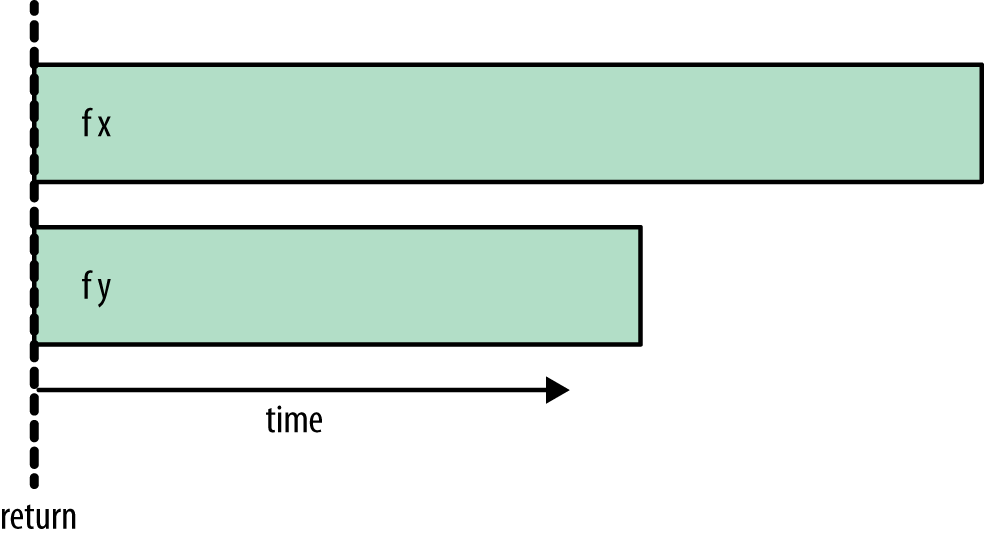
Difference between rpar and rseq (2/3)
runEval $ do
a <- rpar (f x)
b <- rseq (f y) -- change `rpar` to `rseq` here
return (a, b)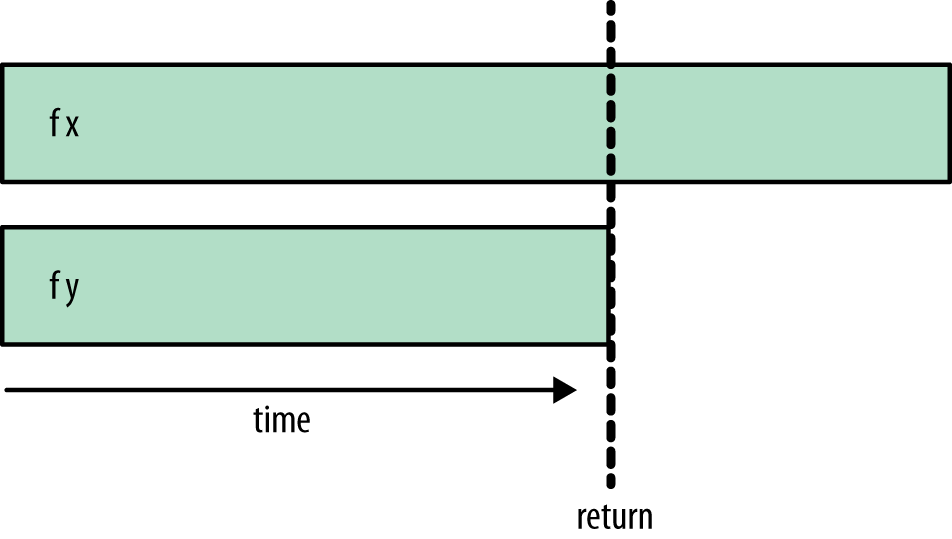
Difference between rpar and rseq (3/3)
runEval $ do
a <- rpar (f x)
b <- rseq (f y)
rseq a
return (a, b)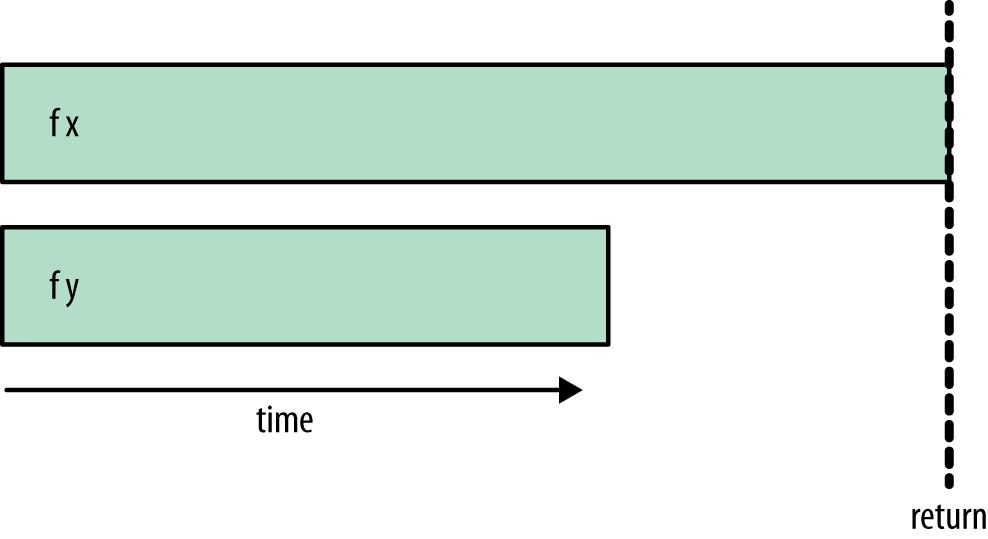
Classic example: fib
module Main where -- TestFib.hs
fib :: Int -> Int -- naive fibonacci
fib 0 = 1
fib 1 = 1
fib n = fib (n - 1) + fib (n - 2)evalFibPair :: (Int, Int)
evalFibPair = (fib 39, fib 38)
main :: IO ()
main = print evalFibPair$ ghc -O2 -rtsopts -eventlog TestFib.hs
$ ./TestFib +RTS -s -l-O2: optimization level
-rtsopts: add ability to use +RTS
-eventlog: add ability to produce log
-s: show stats in terminal
-l: generate .eventlog
threadscope (1/3)
$ threadscope TestFib.eventlog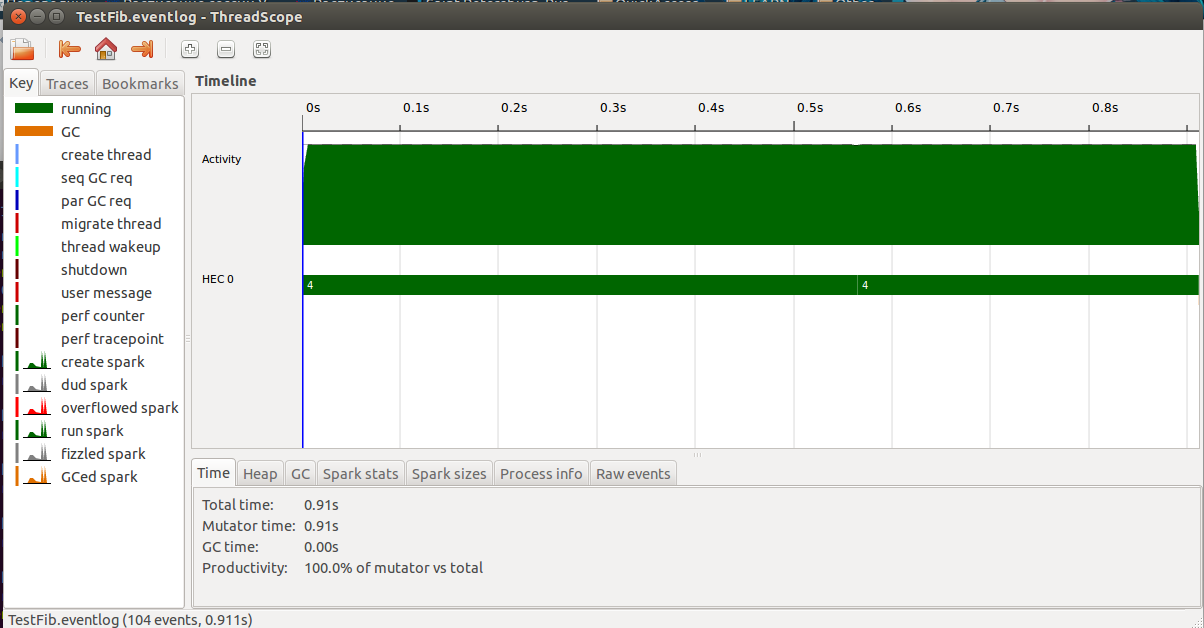
threadscope (2/3)
parEvalFibPair :: (Int, Int)
parEvalFibPair = runEval $ do
a <- rpar (fib 39)
b <- rpar (fib 38)
return (a, b)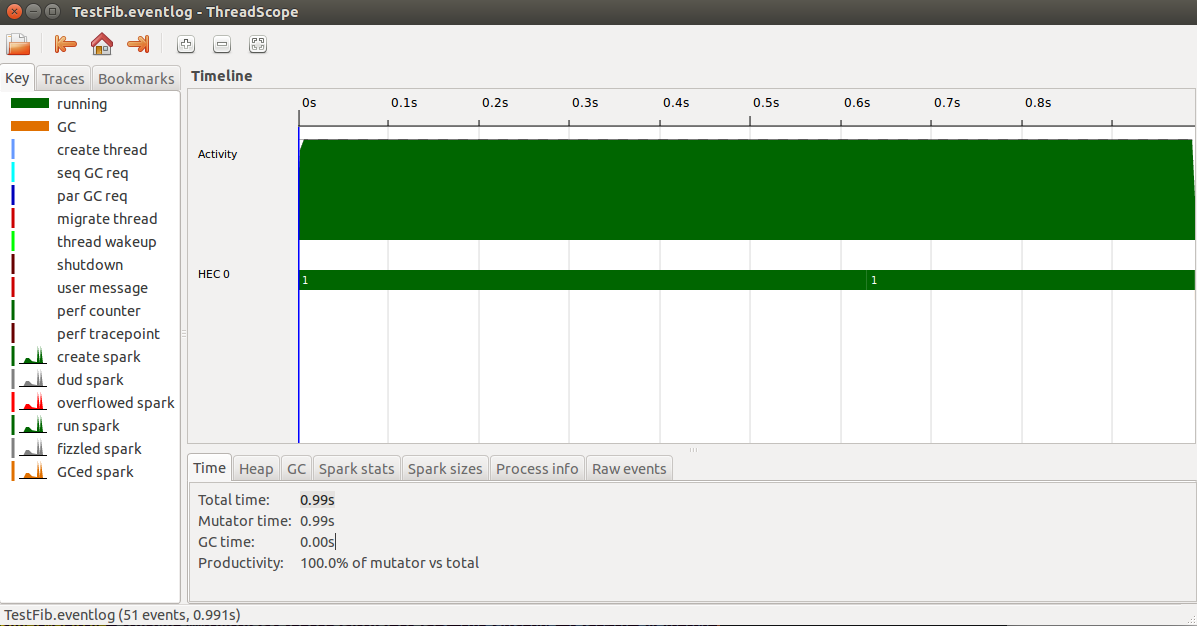
More ghc options
$ ghc -O2 -threaded -rtsopts -eventlog TestFib.hs
$ ./TestFib +RTS -N2 -s -l-threaded: enable threading
-Ni: use i cores in CPU
No default multhreading
threadscope (3/3)
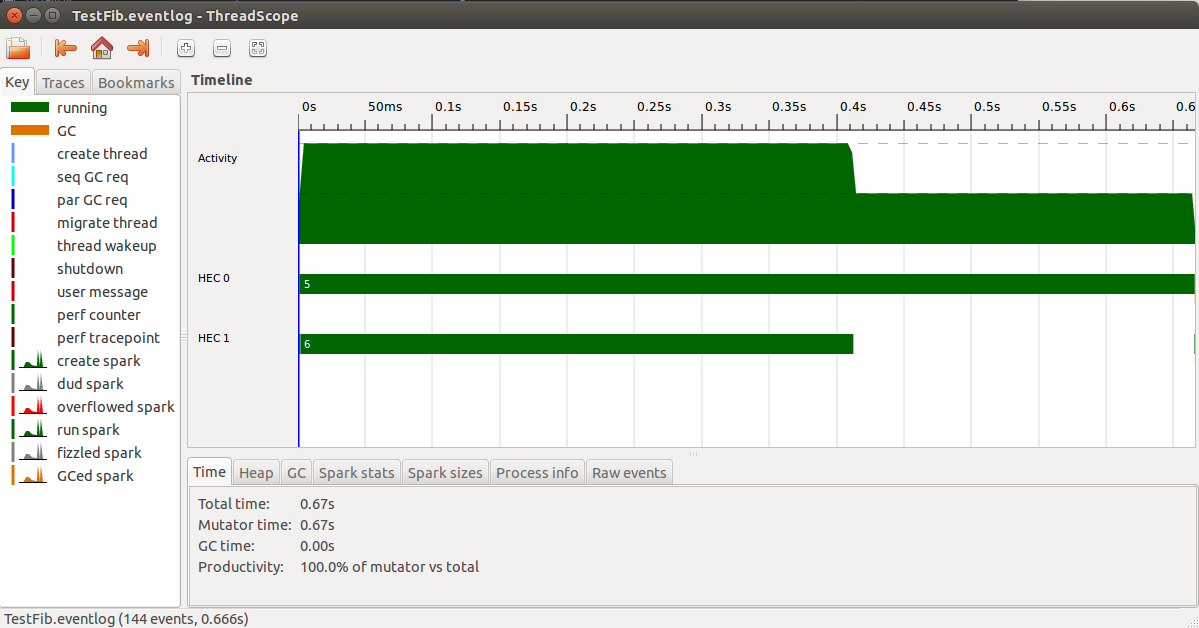
What about sparks?
# some output produced by -s
Parallel GC work balance: 46.74% (serial 0%, perfect 100%)
TASKS: 6 (1 bound, 5 peak workers (5 total), using -N2)
SPARKS: 2 (1 converted, 0 overflowed, 0 dud, 0 GC'd, 1 fizzled)
INIT time 0.003s ( 0.003s elapsed)
MUT time 1.365s ( 0.685s elapsed)
GC time 0.000s ( 0.000s elapsed)
EXIT time 0.001s ( 0.001s elapsed)
Total time 1.372s ( 0.689s elapsed)
converted — useful work
overflowed — sparks generated after spark pool limit achieved
dud — already evaluated at the moment of applying `rpar`
GC’d — unused and thrown away (ignored) ⇒ garbage collected
fizzled — was unevaluated at the time it was sparked but was later evaluated independently by the program
All is immutable and pure ⇒ lets parallelize all!
Problememes?
No automatic parallelization :(
Innacurate parallelism (1/2)
parFib :: Int -> Int
parFib 0 = 1
parFib 1 = 1
parFib n = runEval $ do
a <- rpar $ parFib (n - 1)
b <- rpar $ parFib (n - 2)
pure (a + b)
main = print $ parFib 41 -- ./TestFib +RTS -N4 -s -l
Parallel GC work balance: 55.53% (serial 0%, perfect 100%)
TASKS: 10 (1 bound, 9 peak workers (9 total), using -N4)
SPARKS: 535971258 (120 converted, 188823067 overflowed, 0 dud,
346527789 GC'd, 620282 fizzled)
INIT time 0.001s ( 0.001s elapsed)
MUT time 24.200s ( 6.797s elapsed)
GC time 8.312s ( 2.321s elapsed)
EXIT time 0.001s ( 0.000s elapsed)
Total time 32.514s ( 9.119s elapsed)Innacurate parallelism (2/2)
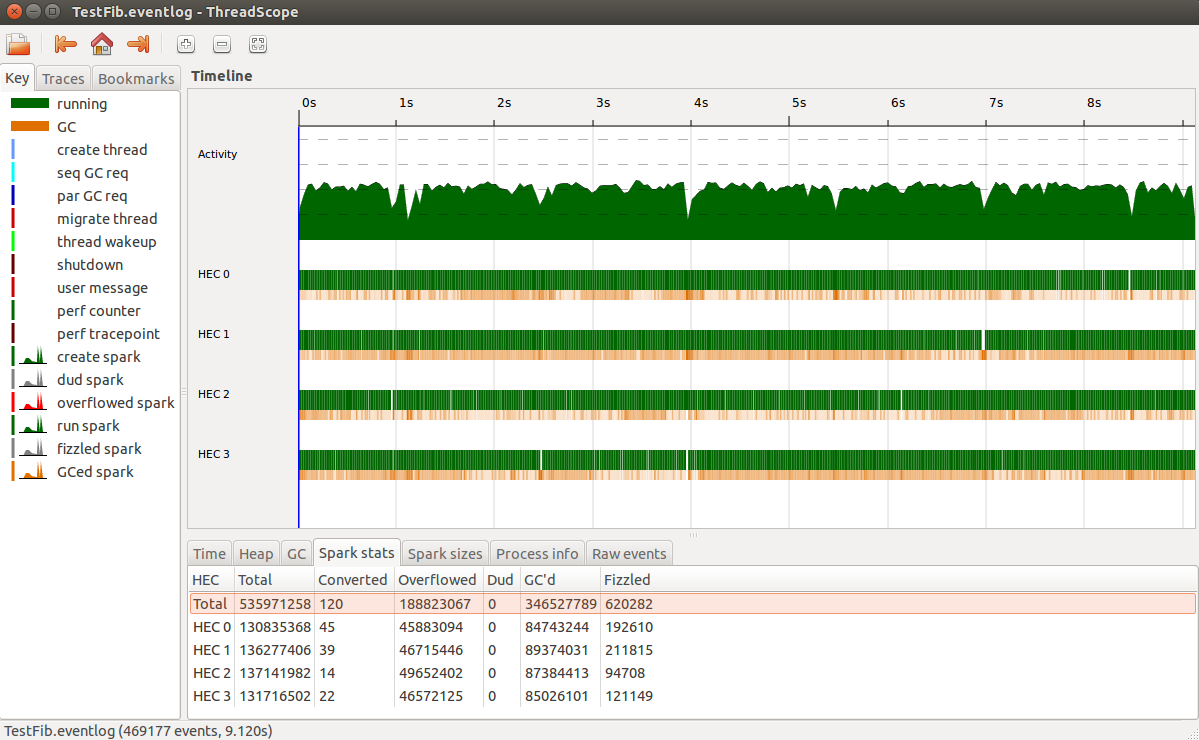
What else?
1. REPA and DPH (parallel arrays, numerical haskell)
2. Channels (Chan and TChan)
3. Par monad
4. Distributed programming (CloudHaskell)
5. GHC scheduler (round-robin)
6. Tuning and debugging
Read all concurrently
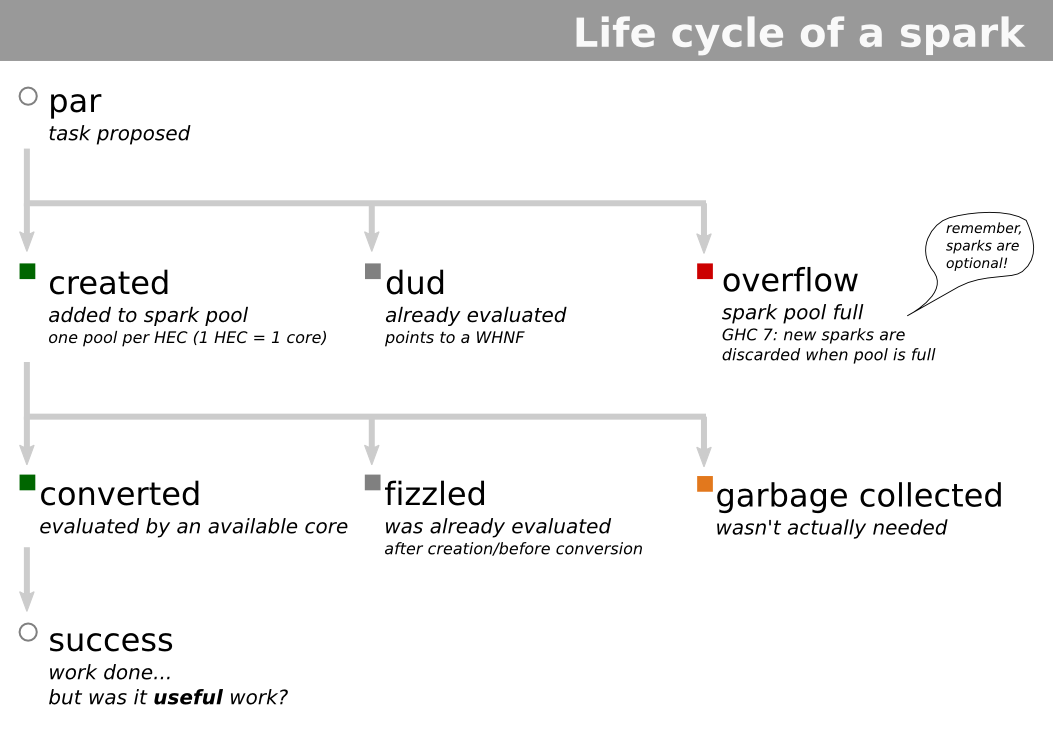
Strategies
rpar :: a -> Eval a
rseq :: a -> Eval aCombine rpar and rseq?
type Strategy a = a -> Eval aparPair :: Strategy (a, b) -- (a, b) -> Eval (a, b)
parPair (a, b) = do
a' <- rpar a
b' <- rpar b
return (a', b')parPair :: Strategy (a, b) -- or even better with applicative
parPair (a, b) = (,) <$> rpar a <*> rpar bparEvalFibPair :: (Int, Int)
parEvalFibPair = runEval $ parPair evalFibPairusing :: a -> Strategy a -> a
x `using` s = runEval (s x)parEvalFibPair :: (Int, Int)
parEvalFibPair = evalFibPair `using` parPair -- !!!withStrategy :: Strategy a -> a -> a -- flipped `using`Combine strategies
dot :: Strategy a -> Strategy a -> Strategy astrat2 `dot` strat1 = strat2 . runEval . strat1rparWith :: Strategy a -> Strategy a -- behaves like: rpar `dot` strat
-- just use: rparWith stratevalTuple2 :: Strategy a -> Strategy b -> Strategy (a, b)
evalTuple2 strat1 strat2 (x1, x2) = (,) <$> strat1 x1 <*> strat2 x2parTuple2 :: Strategy a -> Strategy b -> Strategy (a, b)
parTuple2 strat1 strat2 = evalTuple2 (rparWith strat1) (rparWith strat2)parPair :: Strategy (a, b)
parPair = evalTuple2 rpar rparevalTraversable :: Traversable t => Strategy a -> Strategy (t a)evalTraversable = traverseparTraversable :: Traversable t => Strategy a -> Strategy (t a)
parTraversable strat = evalTraversable (rparWith strat)parList :: Strategy a -> Strategy [a]parMap :: Strategy b -> (a -> b) -> [a] -> [b]parMap strat f = withStrategy (parList strat) . map fparList and GC'd sparks (1/2)
evalList :: Strategy a -> Strategy [a]
evalList strat [] = return []
evalList strat (x:xs) = do
x' <- strat x
xs' <- evalList strat xs
return (x':xs')parList :: Strategy a -> Strategy [a]
parList strat = evalList (rparWith strat)Let's write a tail-recursive version
parList :: Strategy a -> Strategy [a]
parList strat xs = do
go xs
return xs
where
go [] = return ()
go (x:xs) = do
rparWith strat x
go xsparList and GC'd sparks (2/2)
All the parallelism it creates will be discarded by the garbage collector.
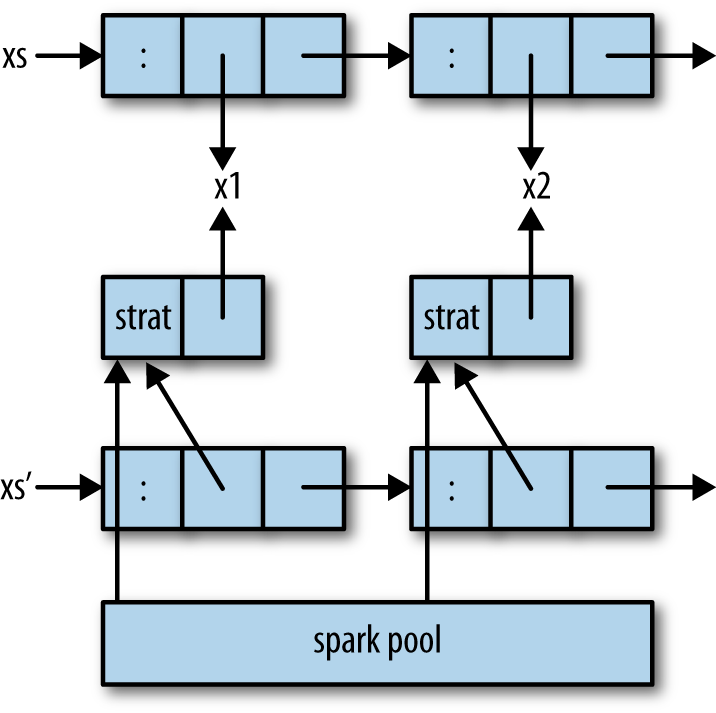
Par Monad
newtype Par a
instance Monad Par where
runPar :: Par a -> afork :: Par () -> Par ()
data IVar a -- instance Eq
new :: Par (IVar a)
put :: NFData a => IVar a -> a -> Par () -- evaluate to NF
put_ :: IVar a -> a -> Par () -- evaluate to WHNF
get :: IVar a -> Par aparMTwoFibs :: Int -> Int -> Int
parMTwoFibs n m = runPar $ do
i <- new
j <- new
fork (put i (fib n))
fork (put j (fib m))
a <- get i
b <- get j
return (a + b)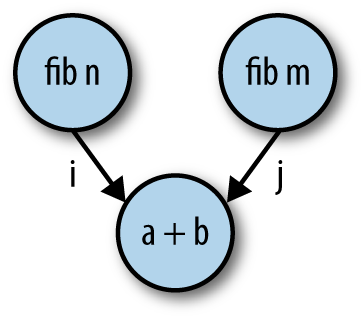
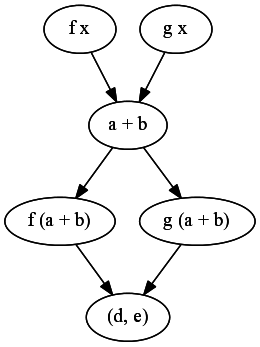
import Control.Monad (replicateM)
import Control.Monad.Par
f, g :: Int -> Int
f x = x + 10
g x = x * 10
example1 :: Int -> (Int, Int)
example1 x = runPar $ do
[a,b,c,d,e] <- replicateM 5 new
fork $ put a (f x)
fork $ put b (g x)
a' <- get a
b' <- get b
fork $ put c (a' + b')
c' <- get c
fork $ put d (f c')
fork $ put e (g c')
d' <- get d
e' <- get e
return (d', e')Par examples (1 / 3)
spawn :: NFData a => Par a -> Par (IVar a)
spawn p = do
i <- new
fork $ p >>= put i
return iPar maps
-- monadic map
parMapM :: NFData b => (a -> Par b) -> [a] -> Par [b]
parMapM f xs = do
ibs <- mapM (spawn . f) xs
mapM get ibs-- simple parallel map
parMap :: NFData b => (a -> b) -> [a] -> Par [b]example2 :: [Int]
example2 = runPar $ parMap (+1) [1..25]Par examples (2, 3 / 3)
-- foldr (+) 0 (map (^2) [1..n])
example3 :: Int -> Int
example3 n = runPar $ do
let range = InclusiveRange 1 n
let mapper x = return (x^2)
let reducer x y = return (x+y)
parMapReduceRangeThresh 10 range mapper reducer 0